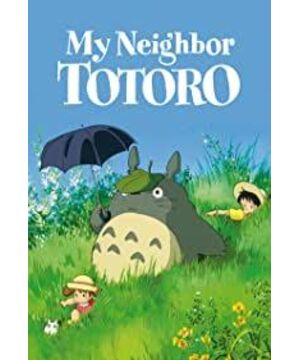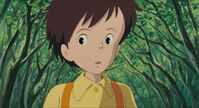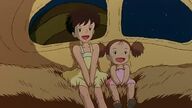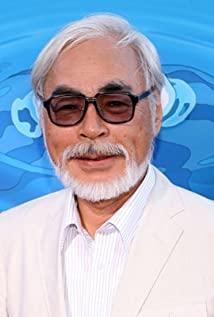When I watch Hayao Miyazaki’s movies, I always think of Zhou Zuoren’s "The Beauty of Humanity in Japan". The full text of the transcript is as follows: When
foreigners talk about the national character of Japan, they always cite loyalty first. I I don't think it's so foolish. Japan’s current emperor education is indeed prosperous, and it has also expressed a lot of achievements in foreign wars, but this seems to be only an external influence and may not represent the true spirit of Japan. Tiger Jiro Naito read the "Japanese Cultural History Research" to see this section, then in the "What is the Japanese culture" chapter:
"Zhongxiao as a language, in the Japanese nation has not been adopted before Shina system is represented by something, the matter is useless It’s hard to find. When the character filial piety is used as a person’s name, it is trained as Yoshi, or Taka. Kindness is not a special term for monarchs. For example, in ancient times, there was no special term of loyalty and filial piety to express family relations and relations between monarchs and ministers in addition to general good deeds and justice, so the existence of this thought is a big question."
Naito He studies the history of the East, and places special emphasis on Chinese culture. This shows that the virtue of loyalty and filial piety was also passed down from China. (Our National Quintessence Party has listened and please don’t have a nose too high.) Now I borrowed this passage from him and I didn’t want my field to divert water, but to prove that Japan’s loyal monarch was originally a Chinese product. Recently, a layer of German paint was added. After all, it is not their own national character that will never change. I think there are many things in Japanese culture that are much better than those in China, but loyalty is not one of them. According to the current situation in China, it seems that there is a tendency to talk about nationalism, but even if this iron armor is worn, it is out of necessity. good. We always wear casual clothes when we sit on the road at home: casual clothes are our truth. We have to regulate Japan, not to look at his two-handed double-sword respect, we have to see what he looks like when he is eating tea and making grass there to know his true face, even though he looks like a wild face in military uniform. Old Mr. Gu Hongming responded to the call of the Dadong Cultural Association and praised the martialization of Japan, or it is no wonder that some literati such as Iafcadio Hearn (Iafcadio Hearn) and PauI Louis Couchoud (PauI Louis Couchoud) are also much less than rabbits. It seems to say that loyalty is the essence of Japan.
In my opinion, the advantage of Japan's national character is in the direction of opposition, that is, it is rich in human favor. In "Ancient Japanese Culture," He Guo Zhelang discussed "The Value of the Art of "Kojiki"," and concluded that:
"The lack of depth in "Kojiki" is to compensate for the sentimental outlook on life. "Kojiki" The beauty of the pastoral song in the whole is the expression of the mood of this Jianze. The lack of depth even if it is a weakness, it is not as great as the mood of lack of this moist. The history books of China that record ancient myths and legends are in the shade of big and deep. It is better than "Gu Shi Ji", but it may not be as good as "Gu Shi Ji" as an artistic theory. Why? Because it lacks emotions, especially as mentioned above, it is obviously insufficient to moisturize the mood. Although "Gu Shi Ji" is like a child Books, but not necessarily inferior to adults’ books in its beauty.”
This mood is Japan’s greatest strength, and it makes us feel close to its culture, and the unrestricted advocacy of loyalty and filial piety will not only make them personal Many tragedies occurred in the middle, which is also an important reason for the abhorrence of the world. In modern Japan, these two kinds of molecules seem to exist equally, so we feel that there is a little brilliance and beauty in the midst of many unpleasant things. January 14th
(written in January 1925, selected from "The Book of Rain") in
which "unrestricted loyalty and filial piety will not only cause many tragedies among themselves" can be said to be Zhou Zuoren's accuracy of the Japanese tragedy of World War II prophecy. When we think of Japanese people, two different images appear in our minds. One is the image of a soldier or samurai who is serious and brutal, committing suicide by amputating abdomen, and the other is gentle and looks like a very innocent woman Nobita’s grandparents in “Cats” roughly reflect these two images respectively). The first kind is close to the personality of "unrestricted loyalty and filial piety" as Zhou Zuoren called, and the second kind represents the beauty of Japanese humanity.
2. Environmental protection issues
Things like people are demons in the eyes of some people. This part of the people think that nature is originally harmonious (or don't think so), and people are the disharmonious part of it, because people have all kinds of unreconcilable, unsatisfied, and contradictory desires (my teacher said, In philosophy, contradiction is a sign of the devil). From a physical point of view, human life is to create entropy increase (increase in entropy). Although other organisms are also producing entropy increase, their numbers are very small compared to humans. Human beings were close to animals in ancient times, but with the development of science and technology, human beings consume the earth's energy faster and faster, and human activities are tantamount to accelerating the destruction of the earth. The fundamental contradiction of environmental protection lies here: the essence of life is to create entropy, and the best way to protect nature is to deny life. People always have to eat, drink, surf the Internet, and go out regularly. Staying still can easily cause that mental disorder. I don’t know what to see in the distance, and I don’t know what the unknown is. I want to explore it all (otherwise I will be labeled as anti-intellectualism). In ancient times, it doesn’t matter if you stand on the seashore and the other side that has never been to the sea (underdeveloped technology). If you have the opportunity today instead of traveling once a year, I am psychologically unbalanced and feel that I have not got what I deserve. All these behaviors are creating an increase in entropy, but people feel uncomfortable if they don't have any of them. This is the magic in people. So how did Hayao Miyazaki deal with the contradictions between (Japan) traditional culture, modernization, technological progress, people and the environment, etc.? The classic mode of Asian countries (Confucius cultural circle) (the classics here are neutral words and do not contain praise) mode: find balance. A group of porcupines huddled together to keep warm. They were so close that they hurt each other, and it was too far to be cold, so they found a moderate point that was neither too painful nor too cold. It's the golden mean. "My Neighbor Totoro" seems to have found such a suitable point: it is neither a city nor a wilderness, but a countryside 30 miles away from the city. In this way, you can get close to (return to) nature, and you can go to work at a university in Tokyo at any time. It has the best of both worlds. The people in the film neither reject modern products (such as buses, telephones, modern medical methods, etc.), nor over-accept them (such as using primitive farming methods). One tendency that the Golden Mean is easy to produce is to reconcile various things (with the development of science and technology, more and more things need to be reconciled by human beings, and the difficulty of reconciling accordingly becomes greater and greater), neglecting to reconcile Part of the factors. This approach is not necessarily artistically wrong (by comparison, "My Neighbor Totoro" is less idealistic than "Goldfish Princess on the Cliff" and "Howl's Moving Castle" Some, that is to say, more realistic), but overly idealized, works of art become castles in the sky, and have nothing to do with reality. The pastoral pleasures described by some ancient Chinese poets are not necessarily wrong, but in addition to the "pastoral pleasures", there are also "pastoral sufferings", which readers should not forget. Some foreigners criticize Asians for having fun in hardship, not knowing to resist, or ignoring reality and pretending to be deaf. This criticism is also reasonable, but we may not necessarily oppose the Golden Mean itself (in many cases, critics of first-class ideas) In fact, only for its second-rate and third-rate practitioners). "My Neighbor Totoro" does not avoid the hardships of country life. The first half of the film is almost a struggle between people and such difficulties. And people overcome difficulties in this kind of hardship and discomfort, and this kind of struggle has a poetic beauty. This is not a simple point of the film. But in any case, the god in the movie has already got on the bus (although it is a poetic bus), which is not far from living in a villa, electricity and heating (I was very cold at the time of writing this article) .
May 4, 2011
View more about My Neighbor Totoro reviews











